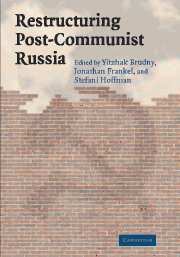Book contents
- Frontmatter
- Contents
- Contributors
- Preface
- Restructuring Post-Communist Russia
- INTRODUCTION
- THE COMPARATIVE DIMENSION
- RUSSIA IN FREE FALL? KEY CHALLENGES
- The Russian transition to the market: Success or failure?
- Potholes on the road to a flourishing Russia: Structural problems in the second decade
- The search for a national identity in the Russia of Yeltsin and Putin
- THE RUSSIAN POLITICAL SYSTEM: TOWARD STABILIZATION?
- Index
The search for a national identity in the Russia of Yeltsin and Putin
Published online by Cambridge University Press: 25 July 2009
- Frontmatter
- Contents
- Contributors
- Preface
- Restructuring Post-Communist Russia
- INTRODUCTION
- THE COMPARATIVE DIMENSION
- RUSSIA IN FREE FALL? KEY CHALLENGES
- The Russian transition to the market: Success or failure?
- Potholes on the road to a flourishing Russia: Structural problems in the second decade
- The search for a national identity in the Russia of Yeltsin and Putin
- THE RUSSIAN POLITICAL SYSTEM: TOWARD STABILIZATION?
- Index
Summary
Scholars tend to view nations as a modern phenomenon, the consequence of the social organization of industrial society. Such a society cannot function unless its members are bound by a common culture, created by its political and intellectual elites and transmitted through a universal system of education. In Western Europe, where modern nations were created in the course of the nineteenth century, strong states were already in existence. Their boundaries determined the membership of national communities. Nations were perceived as civic communities, whose members were all citizens of the state bound by loyalty to its political institutions. The elites in Eastern and Central Europe, where people lived in premodern empires, visualized nations as predominantly ethnic communities, bound by a common language, culture, and history.
In Russia, both the civic and ethnic elements of nationhood were weakened by the peculiar form of Russian state-building. Because Russia was a multiethnic empire, the development of a Russian ethnic identity was stunted. The development of a unifying civic identity within the borders of the state was stultified by the fact that the governments of Russia and the USSR were authoritarian and, moreover, poorly institutionalized compared with governments in Western Europe. Despite the fact that in the Soviet period, Russian ethnic identity was, sometimes unwittingly, advanced through government policies, the process of identity formation was still far from complete in 1991.
- Type
- Chapter
- Information
- Restructuring Post-Communist Russia , pp. 160 - 178Publisher: Cambridge University PressPrint publication year: 2004
- 3
- Cited by



